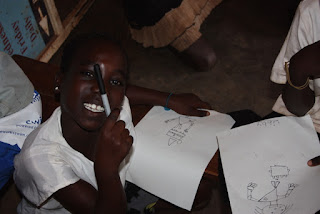When CRED first started taking teams in
Acholi Quarters, we worked with children who weren’t going to school due to the
fact that their parents couldn’t afford to pay the fees and buy the uniform.
The teams would run educational activity
weeks, and the children lapped up the chance to learn basic numeracy and
literacy skills. It was always sad to think that at the end of the visit by the
team, those children had to return to a life that consisted of helping parents
at the quarry, or looking after the younger siblings, fending for themselves,
scouring the place for food much of the time if they wanted anything more than
one meal a day, and making a game out of bottletops left lying around because
that was the closest they came to have toys.
After a few visits, the parents of the
children decided that they weren’t happy with their children only getting
education when the teams turned up, and so they took the step of setting up an
‘educational day care’ and finding a teacher to run it.
This became a source of access to education
for 20 children each morning, and a different 20 children each afternoon, and
Teacher Miriam has been an absolute godsend to them in the way that she cares
about them, puts so much time and effort into the lessons, and gives over and
above of herself for them day in day out.
Some of the children have been fortunate to
be able to gain financial ‘sponsorship’ to move on to formal education, and
when that happens, another child waiting to get that first step on the
education ladder quickly fills the space.
One of the discussions I have been part of
this week has involved this ‘day care’ set up, and considering with the
cooperative of ladies and men who are linked to it, what the future should be
for it – does it stay as is, does it grow, how does it fit with established
schools etc.
The discussion was a very good one, and it
was wonderful to hear the various thoughts and perspectives being batted
around. At the end, the outcome was a very positive one, and gives more focus
and direction for the programme moving forwards.
The team decided that the aim should be to
get all children into mainstream schools, but the reality is that many of the
children aren’t ready to go straight to school from their dysfunctional,
‘survival of the fittest’ type lives. So the ‘daycare’ that Miriam runs is to
be a place of transition – where the children learn how to hold a pencil, how
to do simple numeracy and literacy, how to sit still for more than 2 minutes,
how to share, how to wait their turn…..basically the social skills needed to
get on well in school, as well as some of the academic ones.
During the discussion we also came up with
a name for the programme: the Hopeful Haven – to reflect the fact that it is a
place of hope, of safety and security, and where the children can relax and
feel able to grow as individuals.
The other step forward that came from the
discussion was that Teacher Miriam should have a co-worker, whose focus is to
work with the children on social skills, follow up on non-attenders, liaise
with parents and generally take on the more pastoral role.
This is all so positive, and it is
wonderful to see how much it is being directed from within. When I think back
to the start of our teams, and how lacking in confidence and self-belief the
ladies were then, and then look at those same ladies now making decisions and
plans for the community themselves – certainly evidence of folks empowered, and
feeling equipped and confident enough to take their rightful place in their
community.
And of course, at the centre of it all are
the children – feeling hopeful, feeling loved, feeling safe, and knowing that
they can be on the way to a better life




No comments:
Post a Comment